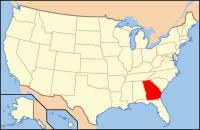Tift County, Georgia
| Tift County, Georgia | |
|---|---|

Tift County Courthouse, (Built 1912), Tifton
|
|
 Location in the U.S. state of Georgia |
|
 Georgia's location in the U.S. |
|
| Founded | August 17, 1905 |
| Named for | Nelson Tift |
| Seat | Tifton |
| Largest city | Tifton |
| Area | |
| • Total | 269 sq mi (697 km2) |
| • Land | 259 sq mi (671 km2) |
| • Water | 9.9 sq mi (26 km2), 3.7% |
| Population (est.) | |
| • (2015) | 40,764 |
| • Density | 155/sq mi (60/km²) |
| Congressional district | 8th |
| Time zone | Eastern: UTC-5/-4 |
| Website | www |
Tift County is a county located in the south central portion of the U.S. state of Georgia. As of the 2010 census, the population was 40,118. The county seat is Tifton.
Tift County comprises the Tifton, Georgia Micropolitan Statistical Area.
The county was created on August 17, 1905, and is named for Henry Harding Tift, who founded Tifton. In 1872, Tift purchased about 65,000 acres of virgin pine timberland there in the wiregrass section of South Georgia and established a sawmill and a village for his workers. Tift eventually expanded into turpentine and barrel-making operations, and turned his barren timberlands into farms for cotton, corn, livestock, fruit, tobacco, pecans and sweet potatoes. When the Georgia Southern and Florida Railway intersected the Brunswick and Western Railroad near Tift's mill in 1888, the settlement was connected to Atlanta and became a boom town. It was incorporated as Tifton by the Georgia Legislature in 1890.
Tift provided employment and financial growth opportunities for his flourishing market center by founding the Tifton Cotton Mill, the Bank of Tifton, and other types of businesses in which he had a leading interest. These included fruit growing, groceries and general merchandise, cottonseed oil, lumber, brick and stone, and several railroads, all essential for the development of a region. Tift also established a model farm north of town and donated a large parcel of acreage for an agricultural experiment station; these enterprises led eventually to the development of Abraham Baldwin College and the Coastal Plain Experiment Station in Tifton.
Tift’s civic commitment was most evident in his donation of lands for churches (Methodist, Baptist, and Episcopal) and Fulwood Park, and in his decades of service as a city councilman and mayor. Through a variety of business and civic undertakings, Tift contributed significantly to the economic and social development of south central Georgia. Though a captain of industry, agriculture, and finance, he is best remembered for his civic service and generosity.
...
Wikipedia
